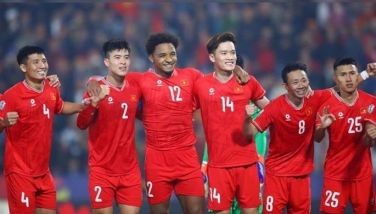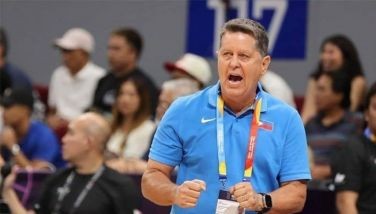A Reflection on 'The Breaks of the Game: Ateneo-La Salle 2014'
(Before anything else, I wish to disclose that I am from Ateneo, and the views of this article reflect my own viewpoints, and not that of my alma mater.)
I would have admired Coach Juno Sauler more if he not only complained about Kiefer Ravena’s and the Ateneo team’s ability to sell fouls through flopping, and I quote “Their players can sell fouls even when taking jump shots,” but also if he cited the instances of when fouls were not called on his squad. Prominent examples include a pen being thrown at the court by a member of his coaching staff (which should have led to a technical foul), or the two instances that Chris Newsome became a victim of wrong calls Sunday. The first one was the foul called on Newsome (shown in the above photo). The second was the absence of a foul on Newsome when he made that 3-point shot, and the conspicuous absence of a replay at the Araneta Coliseum screens of that event happening. If Coach Juno also said, “My team is lucky that fouls are not called on us often,” or if he said “My team is lucky since the breaks of the game favored us a lot,” then I would have saluted the man as a true man of integrity.
Moreover, the timing of his statement about Kiefer Ravena’s flopping, and its appearance on another online portal shows how some media outlets tend to sensationalize certain statements, even at the detriment of the opposing side. In one article from a major local sports website, there was no attempt to get the side of the Ateneo team, even if it was not an opinion or analysis piece.
I have heard constantly of the stand of people in sports that these incidents are called “Breaks of the game.” Moreover, I concede that Ateneo would have won if it shot better at the free throw line. But even with this, I wish to call a reflection on what “Breaks of the game” does as part of character development, and how these also reflect some sort of betrayal of a school’s mission of education.
First, the argument of “Breaks of the game” hinges on the assumption of human error. Referees are human, and they also make mistakes. Thus, wrong calls and missed calls are part of every game. Basketball also tends to be a physical game, and thus, there will be instances of elbows hitting players, among other incidents. The concept of “Breaks of the game” teaches a player to have a strong character, to not allow these human errors to affect his or her performance during the games. I personally agree with this stand. Referees make errors, and these errors serve as a challenge to all those involved to let will overpower circumstance, and still drive the spirit that wins games.
However, from an educational perspective, these “breaks of the game” have been accepted as part of the sport already. I admire Commissioner Andy Jao’s statement about the spotty officiating of previous seasons, which led him to hire referees from the pool of Joel Lipa. Jao was quoted as saying, “I don’t want to use the referees that were used in the last two years. I just don’t like the way they called the games.” However, being part of the UAAP (University Athletic Association of the Philippines – emphasis on University added), it is important to continuously address this issue. It is not enough that these incidents be dismissed as mere breaks, but rather, mechanisms should be created to address these wrong calls or non-calls. This is part of the mission of any university, which is to teach.
Reflecting on it from the point of view of wider society, if the “Breaks of the game” would be accepted as just an inevitable part of basketball, then other social issues such as poverty, crime and illiteracy are also inevitable parts of society. However, recognizing that these are social ills, institutions and kind-hearted people move to address these inequities. Should not the same standard apply to university basketball?
In the end, the question I am asking is this: If we allow this institution called “Breaks of the game” to persist because it is inherently part of university basketball, without taking steps as administrators, faculty and alumni, what are we teaching our students, who are also our players and part of our audience during these games?
- Latest
- Trending





























